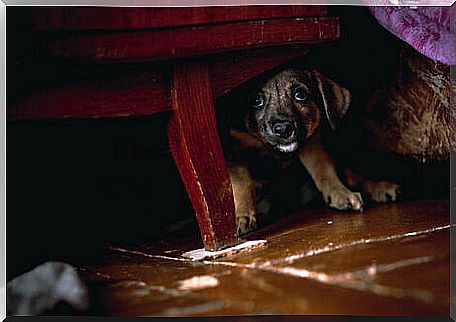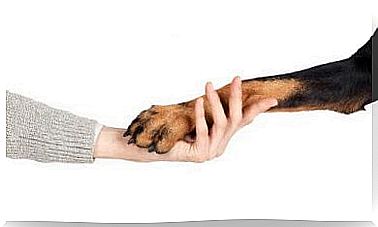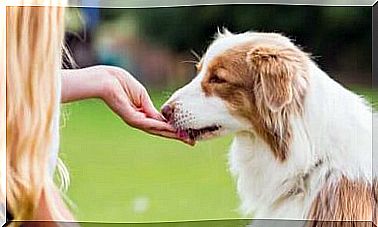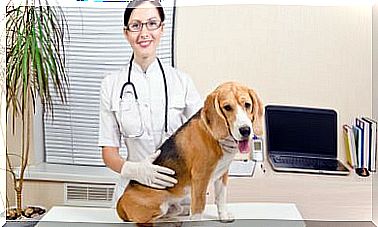What Are Dogs Afraid Of?

If you’re thinking about sharing your life with a dog and want your arrival home to be as smooth as possible, you may be wondering what dogs are afraid of. Some animals can develop phobias if this issue is not handled properly.
In the following lines, you will find the elements that tend to arouse fear in dogs, as well as a series of tips for dealing with these nervous breakdowns. Don’t miss it!
What are dogs afraid of?
1. Stairs
2. Loud noises
The difference between dogs and humans in reacting to loud noises is that we know the source of the sound. Imagine that you didn’t know what thunder is: wouldn’t you be afraid of a sound that comes from the sky, suddenly and very loud?
Loud, sudden noises like fireworks, storms, cars or screams scare them. Unfortunately, this increases the feeling of helplessness, as dogs don’t know where the sound is coming from. Later, we’ll explain how to help your dog if he has this problem.

3. Loneliness
Some dogs are afraid to be alone, which sometimes leads to separation anxiety. Dogs that have a more dependent personality or that have been abused are more vulnerable to feeling this fear, as they do not tolerate the uncertainty of when their guardian will return well.
4. Cars
This fear takes two forms: the fear of nearby cars – because of their noise, size and speed – and the fear of riding in a vehicle. The latter has to do with the car’s internal sounds and the feeling of movement. Dogs may also have associated the car ride with feeling dizzy or having a traumatic event.
5. What are dogs afraid of? the veterinarian of course
You’ve certainly witnessed the scene of a dog trying desperately not to enter the clinic. Of course, the procedures these animals go through in an appointment – strangers doing things that sometimes hurt and don’t happen every day – can make your pet fearful.
6. Fear of strangers
Fear of strangers is strongly associated with socialization problems. If, in addition, it is a dog that has had bad experiences with humans, it may bond with its guardian and distrust other people. It is important to correct this problem considering the social realm, not just an isolated fear.
7. Darkness
This fear is more common in puppies, as at night the vision changes and some objects are unrecognizable to them. Some noises that only occur at night – nocturnal animals, for example – are also often frightening for a dog.
How to deal with these nervous breakdowns?
The first thing to do is identify when the dog panics. In these crises, dogs often try to escape, stick to the ground, defecate, tremble, bark, growl and even attack. You can also see some bodily signs, such as dilated pupils, backward-facing ears, and tail tucked between your legs.
The most appropriate course of action in these cases is to remain as neutral as possible to the stimulus: you should not reward or scold the animal. The dog must process this stimulus for itself, not through your response to his behavior.
If the dog needs to move away, allow him to do so and then move closer to him slowly. Taking a step at each stage is essential to dealing with most phobias in animals, as it allows them to adjust to their own habituation rate.
What are the most nervous dogs afraid of?
A phobia can be something that seriously disrupts a dog’s life, just as it happens to humans. What for one animal is an easily overcome fear, for another more nervous it can be a more serious problem.

In conclusion, the main recommendation in these cases is that you don’t let the problem escalate. If you notice that your dog’s happiness – and by extension, yours – is affected by his fears, see a specialist.









